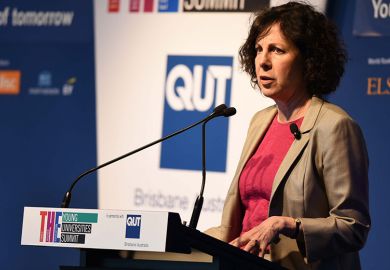Bar crawls, clubbing and impromptu corridor parties are some of the hedonistic activities usually associated with freshers’ week.
Dressing up in a suit and tie for a professional photo-shoot, however, is definitely not one of them. Nor is creating a CV for potential employers high on the “to-do list” of most undergraduates in their first week at university.
However, at the University of Technology Sydney’s orientation weeks, students will find a line of freshly ironed white shirts, jackets and ties hanging in the middle of campus, as well as a professional photographer ready to take mugshots.
“We provide suits and shirts – many students don’t have them at that point – so undergraduates can have a professional photo good enough for their LinkedIn profile,” Attila Brungs, vice-chancellor and president at UTS, told Times Higher Education.
“We’re not preparing people to be students here, but professionals – we are saying ‘you are a professional and you need to think of yourself as one’,” added Professor Brungs, who, as both a former manager at McKinsey and a trained research chemist, has more experience of the private sector than most vice-chancellors.
Encouraging students to don a shirt and tie for a profile picture in their first week at university is just one of the ways that UTS is forcing undergraduates to think more strategically about their careers.
UTS has integrated internships into its curriculum, rather than seeing contact with industry as a desirable add-on for students. Alternatively, students can undertake a period of volunteering, after which they will be asked to reflect on how the experience might inform their future career. Last year, about 22,000 students completed one of these placements, Professor Brungs said.
Search for academic jobs in Australia
However, UTS is just as keen to enable students to start their own businesses, said Professor Brungs, one of Australia’s youngest vice-chancellors, having been appointed at the age of just 42 in early 2015.
“When we surveyed our students, 40 per cent said they didn’t want a job – they wanted to create their own job and run their own business,” he explained.
With the university situated close to Sydney’s tech start-up hub in Darling Harbour, UTS has chosen to be as welcoming as it can to budding entrepreneurs – both from within the university and from outside it.
As part of an A$1.5 billion (£860 million) upgrade of its estate since 2008, the university has created a number of affordable small business units within its landmark buildings, where start-ups at work can be easily seen by students.
“We’ve made our campus as porous and open to the community as we can,” said Professor Brungs, whose on-site entrepreneurs frequently give public talks and provide placements for students keen on starting their own company.
“My job as a vice-chancellor isn’t just about educating students, but thinking how can I get them good jobs,” he said, adding that “if we can help a local medium-size firm to become a bigger firm, that can only be good for my students.”
UTS is not the only university looking to work closely with start-ups. In the UK, such willingness is perhaps most in evidence close to London’s so-called Silicon Roundabout, where London Metropolitan University hosts some 30 start-ups at its Accelerator business incubator centre, in Shoreditch, of which about half were founded by its students and graduates. Last year, the start-ups – which employ between two and 20 people each – attracted £8.8 million of investment, generated £9 million of revenue and hosted numerous London Met students keen to bring their own ideas to market.
“As soon as students step into a working business environment, you can see their attitude [to being an entrepreneur] change instantly,” said Toby Kress, head of London Met’s Accelerator. “With dedicated mentors, we give students a creative space to experiment – learning is about doing here.”
The approach being taken by UTS and London Met was backed by Leanne Kemp, the Australian founder of Everledger, which uses blockchain technology to prevent fraud in the diamond industry. She said that many entrepreneurs require only “good coffee, good wi-fi and a desk” to get started.
“Some students will thrive in the highly regulated set-up of an internship in a large corporation but others want the chaos of the start-up, where you are battling for survival every day,” Ms Kemp said.
POSTSCRIPT:
Print headline: Smarten up: focusing on graduate employability
Register to continue
Why register?
- Registration is free and only takes a moment
- Once registered, you can read 3 articles a month
- Sign up for our newsletter
Subscribe
Or subscribe for unlimited access to:
- Unlimited access to news, views, insights & reviews
- Digital editions
- Digital access to THE’s university and college rankings analysis
Already registered or a current subscriber?




